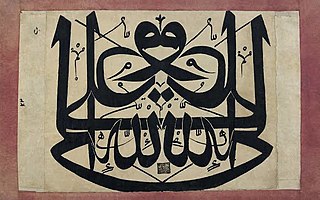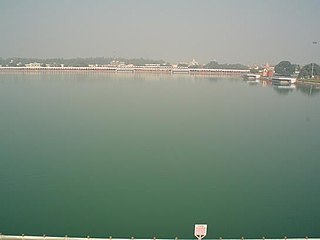Related Research Articles

Sufism, also known as Tasawwuf, is a mystic body of religious practice within Islam characterized by a focus on Islamic spirituality, ritualism, asceticism and esotericism.

A tariqa is a school or order of Sufism, or specifically a concept for the mystical teaching and spiritual practices of such an order with the aim of seeking haqiqa, which translates as "ultimate truth".

The Naqshbandi, also known as Naqshbandiyah, Neqshebendi, and Nakşibendi is a major Sunni order of Sufism. Its name is derived from Baha-ud-Din Naqshband Bukhari. Naqshbandi masters trace their lineage to the Islamic prophet Muhammad and Abu Bakr, the first Caliph of Sunni Islam. The current supreme leader is Prince Sayyid Raphael Dakik, who is a blood descendant of the founding father Bahauddin Naqshband in the 19th generation as 14th Hazrat Ishaan.

The Shadhili Tariqa is a Sufi order of Sunni Islam founded by Abul Hasan Ali ash-Shadhili in the 13th century and is followed by millions of people around the world. Many followers of the Shadhiliya Order are known as Shadhilis, and a single follower is known as Shadhili.

The Jerrahi are a Sufi tariqah (order) derived from the Halveti order. Their founder is Hazreti Pîr Muhammad Nureddin al-Jerrahi (1678-1720), who lived in Istanbul and is buried at the site of his tekke in Karagumruk, Istanbul. Nureddin was a direct descendant of Prophet Muhammad both from his mother and father. The path he founded is dedicated to the teachings and traditions through an unbroken chain of spiritual transmission (silsilah) that go directly back to Prophet Muhammad. During the late Ottoman period, the Order was widespread throughout the Balkans, particularly Macedonia and southern Greece (Morea). The Jerrahi Order of Dervishes is a cultural, educational, and social relief organization with members from diverse professional, ethnic and national backgrounds.

The Qadiriyya are members of the Sunni Qadiri tariqa. The tariqa got its name from Abdul Qadir Gilani, who was a Hanbali scholar from Gilan, Iran. The order relies strongly upon adherence to the fundamentals of Sunni Islamic law.

Thanesar city or old Kurukshetra city is a historic town and an important Hindu pilgrimage centre in the state of Haryana in northern India. It is located in Kurukshetra district, approximately 160 km northwest of Delhi. Thanesar city means old name of kurukshetra city.

Kurukshetra is a city in the Indian state of Haryana. It is also known as Dharmakshetra and as the "Land of the Bhagavad Gita".

ʿAbdul Qādir Gīlānī, known by admirers as Muḥyī l-Dīn Abū Muḥammad b. Abū Sāliḥ ʿAbd al-Qādir al-Jīlānī al-Ḥasanī wa'l-Ḥusaynī, was a Sunni Muslim preacher, ascetic, mystic, jurist, and theologian, known for being the eponymous founder of the Qadiriyya tariqa of Sufism.
A Sheikh or shaykh, of Sufism is a Sufi who is authorized to teach, initiate and guide aspiring dervishes in the Islamic faith. He distracts himself from worldly riches and women. The sheik is vital to the path of the novice Sufi, for the sheik has himself travelled the path of mysticism. Viewed as the spiritual master, the sheik forms a formal allegiance (bay'a) to the disciple of Sufism and authorizes the disciple's travels and helps the disciple along the mystical path. Islamic tradition focuses on the importance of chains and legitimization. In Sufism, sheiks are connected by a continuous spiritual chain. This chain links every previous Sufi sheik, and eventually can be traced back to the Successors, and in later times to the Prophet himself. As Sufism grew, influential shayks began to acquire spiritual centers and waypoints known as khanqah, ribat, and zaouia. Sheikhs duplicate the Prophetic realities, and are also expected to perform and act as an intermediary between the Creator and the created, since the sheikh has arrived close to God through his meditations and spiritual travels. There are several types of such sheikh.

Shah Hussain, also known as Madhoo Lal Hussain, was a 16th-century Punjabi Muslim Sufi poet who is regarded as a pioneer of the Kafi form of Punjabi poetry. He lived during the ruling periods of Mughal emperors Akbar and his son Jahangir.
The Banaadiri people are a nationality in Somalia. Banaadiris largely inhabit Somalia's southern coastline.

The Shattari or Shattariyya are members of a Sufi mystical tariqah that originated in Persia in the fifteenth century C.E. and developed, completed and codified in India. Later secondary branches were taken to Hejaz and Indonesia. The word Shattar, which means "lightning-quick", "speed", "rapidity", or "fast-goer" shows a system of spiritual practices that lead to a state of "completion", but the name derives from its founder, Sheikh Sirajuddin Abdullah Shattar.

Abd Al-Rahman bin Abdullah al Shashi, popularly known as Sheikh Sufi, was a 19th-century Somali scholar, poet, reformist and astrologist.

'Ibrahīm Bin ʿAbd-El-ʿAzīz 'Abu al-Magd, better known as El Desouki (الدسوقي), was an Egyptian Imam and the founder of the Desouki Order.
we

Sheikh Chilli's Tomb is complex of structures located in Thanesar, in the Kurukshetra district of Haryana, India. It includes two tombs, a madrasa, Mughal gardens and various subsequent features.
Tourism in Haryana relates to tourism in the state of Haryana, India. There are 21 tourism hubs created by Haryana Tourism Corporation (HTC), which are located in Ambala, Bhiwani Faridabad, Fatehabad, Gurgaon, Hisar, Jhajjar, Jind, Kaithal, Karnal, Kurukshetra, Panchkula, Sirsa, Sonipat, Panipat, Rewari, Rohtak, Yamunanagar, Palwal and Mahendergarh.
Sheikh Chilli may refer to:

Syed Mohammed Mukhtar Ashraf (Urdu: سید محمد مختاراشرف, Hindi: सैयद मोहम्मद मुख्तार अशरफ़) well known as Sarkar E Kalan or Shaikh ul Mashaikh was an Indian Sufi saint, spiritual leader, Islamic Scholar of Ahle Sunnah of the Ashrafi sufi order from Ashrafpur Kichhauchha, Uttar Pradesh, India. He was a relative of Sajjada nashin of Dargah Ashraf Jahangir Semnani, founder of the Ashrafi Sufi Order. Syed died on 21 November 1996 in Ashrafpur Kichhauchha and was buried near dargah of Ashraf Jahangir Semnani.